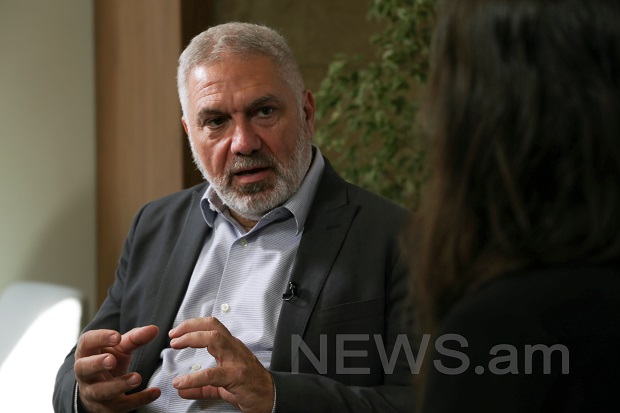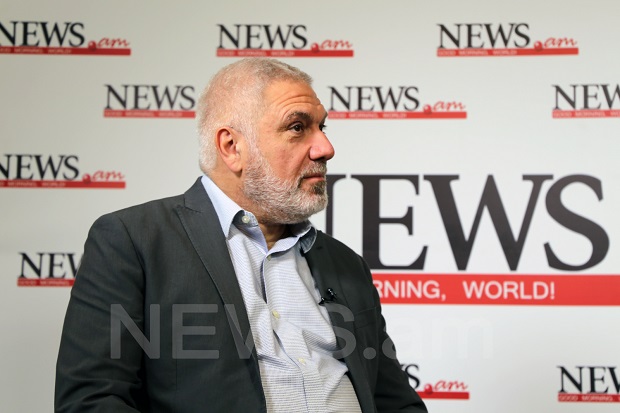
Motorized prostheses, machine learning diagnosis of amblyopia: what projects are TUMO Labs working on?
Motorized prostheses for people with amputated limbs, software for human mood analysis, and diagnosis of amblyopia (lazy eye) using machine learning - these are just some of the projects TUMO Labs is working on today.
TUMO Labs Chief Development Officer Pegor Papazian told NEWS.am TECH that there are also projects in other areas. For example, there are projects with SAP (Germany), which create digital twins, avatars that analyze business processes, and self-service applications, which, for example, can be used in the banking sphere.
Motorized prosthetics and machine learning
TUMO Labs is working on motorized prosthetics in collaboration with Oqni, Papazian said.
"Oqni is a very interesting company that we work with that works on prosthetics. In this case, there is an open-source project to solve the problem of motorized prosthetics, which assist in the walking process. It is a leg prosthetic that motors and the nerves signals from the user, guide the functioning of the motors so that it adapts to the walking cycle of the person in real-time and results in a very comfortable walk. We are working on this for several months now and we have had some successes," Papazian said.
Some of the prostheses are already on the market, but he said they continue to be improved to make the 2.0 version more durable and reliable.

Now, experts are working on prosthetic legs, but in the future, this technology could be applied to other areas. And we are not just talking about prosthetic arms, but also many other areas not related to prosthetics in any way.
"We work on leg prosthetics but of course, this can be applied to any process that is guided by the signals from the nervous system of the human. We even had a prototype where we moved the remote control car without any intervention consciously from the user except for the leg movements․ So any system can be kind of interfaced with the human brain in that way using machine learning to figure out the right connection between the very large number of nerve signals coming in overtime and the intended behavior of the motor or machine or the using interface," Papazian noted.
TUMO Labs' projects, he said, are research and development projects, so most are long-term. But the results of some can be obtained very quickly.
"All our projects are research and development projects so they are quite long-term. Some of them will give results very quickly, for example, we had a team working with Crisp – the local successful startup in noise cancelation – on sentiment analysis and text summarization for different projects and both of them are already going into production. All the students working on this project were hired into Crisp, which was a big success for us," Papazian noted.
Youth in technology
According to Papazian, ensuring an equal ratio of men and women in technology is now considered a global challenge. At TUMO Labs, however, there is no such problem: more than 50% of the students there are girls. Boys and girls receive the same education, learn the same things, and work on different projects together.
"The global challenge is to get the right proportion of male and female into the technology world. We are very proud that at the TUMO Labs it’s more than 50% female participation and I am talking about more than 10 000 applicants of which we select several hundred to work on our projects, go to our coding boot camp, etc. However, the challenge faced by all of them is to access real-world projects and situations. So to make the job from an academic education that they get in university to something that is much more valued by the employers. First is a set of attributes like self-confidence, initiative taking, and teamwork communication they have to learn, which is something that you learn very well when you are forced to work in a team on a real-life project, and then to apply their knowledge and their theoretical skills to real-world programs where they will see that there is a lot more nuanced and specifics that will make the difference between them being a less or more competitive participant of ecosystems or for employers," he noted.
According to Papazian, we can and should learn a lot from international best practices in education. Moreover, Armenia should go even further and start innovating in both technology and education.
"We can and should learn a lot from international best practices in education. But I think Armenia has to go further and innovate at the level of tech and education in general, and technology education in particular.
"An example of something we are trying to do in TUMO Labs is we observe that to teach things like Python and machine learning and linear algebra, etc., which are key skills today, there is a lot of good material out there, there is no reason to invent that, but students cannot access that efficiently because they don’t have that discipline to follow through, don’t have anyone checking on them, so most of them end up not completing them.
"What we did is we created a system, a software that adds a value layer on top of this, guides you to the online education resources, helps you decide which ones are more appropriate for you depending on your level of interests, and that follows through giving periodic exercises and tests and helps us track your progress through it.
And just by adding that learning manual system, we radically improved the performance of students using these open-source educational resources. This is an example of innovation, this has not been done anywhere in the world before as far as we know. And now there is a European major organization, which is interested in franchising the model outside," he added.
- Most read
month
week
day
- iPhone users are advised to disable iMessage: What risks are hidden in it? 1447
- Problems with Android 15: NFC contactless payments no longer work on smartphones with updated operating systems 1143
- Pavel Durov gives interview to Tucker Carlson: From 3-hour interview, less than hour appears in final version 1042
- AMD Ryzen 7 processor, 24 GB of RAM and only $550: Mechrevo presents inexpensive and powerful laptop (photo) 795
- The 5 most controversial buildings ever built: Bold design or complete failure? (photo) 770
- Black Shark smart ring from Xiaomi to have interesting characteristics and phenomenal autonomy: 180 days of operation without recharging (photo) 760
- Armenia takes 89th place in terms of mobile Internet speed, but leads region in terms of fixed line speed 660
- 3 best smartphones under $160 637
- Telegram receives major update and sticker editor 631
- No internet access required? How AI will work in iPhone 542
- Archive

